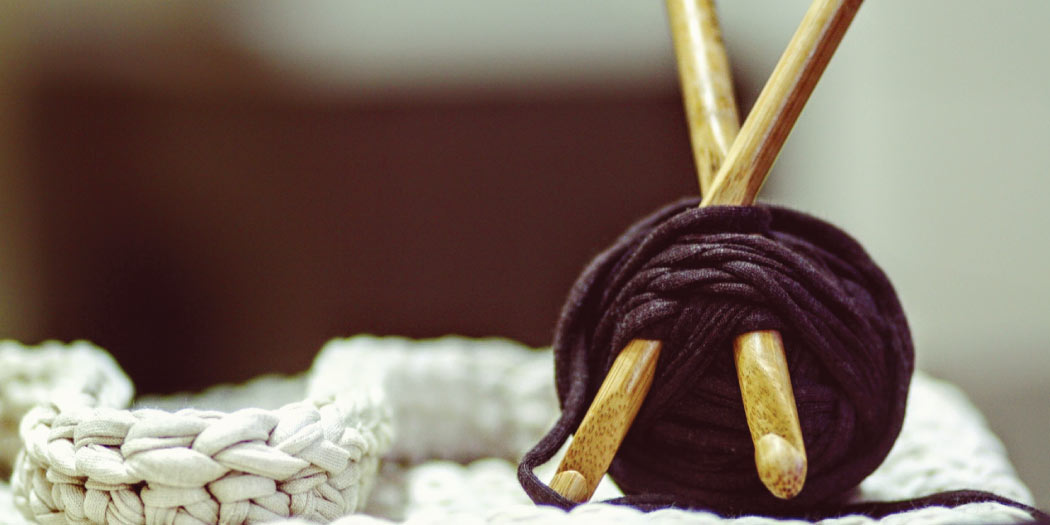
Crocheters’ Philanthropy Empowers People to Rise Above Poverty
If you thought that crocheting was a hobby relegated to grandmas sitting in a rocking chair making doilies and afghans, think again. A recent study by the Craft and Hobby Association found that more than 17 million households in the US house a crocheter—men, women, boys, and girls who all learned the craft at various stages of their lives.
Our conversation with Vincent Green-Hite proved that point. At the age of 21, he turned his passion for crocheting small stuffed Amigurumi characters into his own company Knot Bad. And when he’s not crocheting cute little Pokémon characters for profit, you’ll find him giving back through The Gracie Project, which donates crochet dolls and caps to children with cancer.
We at Accidental Information love a good story about people making their living doing what they love. And when they’re doing so while helping others, even better.
That’s what drew us to a non-profit called Krochet Kids intl. (KKi), which is changing the lives of women and their families in Uganda and Peru—one crocheted beanie at a time.
So who are these capped crusaders? And what’s got us all excited about them?
First, we love that their inspiration for the company started with a skein of yarn, a crochet hook, and the desire to look cool on the slopes. But what’s got us hooked even more is how the company evolved. It’s almost like a coming of age story that mirrors the founders’ journeys from boys to men.
We did some research via KKi’s website and other places on the web, and found that KKi has a great story—one that can teach us about our own journeys.
High School Hookers
KKi co-founders Kohl Crecelius, Travis Hartanov, and Stewart Ramsey started crocheting in high school. They were inspired by Kohl’s brother, who learned to crochet while away at college. Avid snow sports enthusiasts, the threesome loved wearing their unique headwear creations on the slopes and reveled in the novelty of crochet not being a “traditional” hobby for high school guys.
Before long, their caps caught the attention of their classmates and they began taking custom orders and selling their crocheted wares. It was around that time that their local Spokane, WA newspaper dubbed them the Krochet Kids.
As it frequently does, college transplanted the inseparable pals onto three different campuses. And while they continued to dabble in crochet with new friends, they started to focus on bigger and better things—like traveling the globe, volunteering their time, and getting really curious about how they could help others in need.
“By teaching these people to crochet, we would be empowering them to rise above poverty.”
An Idea is Born
As Kohl tells the story (see the video below), while Stewart was on a summer trip in Uganda, he learned about people who had been living in government camps for more than 20 years due to a rebel army that had ravaged the northern part of the country. Entire generations grew up only knowing the camp and relying on the government and aid organizations for their every need.
Stewart was struck that the aid efforts up to that point were focused on temporary needs. But this was contrary to what he was hearing from the Ugandans—they didn’t want handouts, they wanted to work so that they could make a better life for themselves and their families.
“We realized the simplicity of crocheting to be its most profound quality,” says Kohl, who is now CEO of KKi, in a message on the organization’s website. “With hook and yarn people could make amazing products. Being paid a fair wage to do so would allow for them, for the first time, to provide for their families and begin planning for the future. By teaching these people to crochet, we would be empowering them to rise above poverty.”
Creating a Non-Profit
It was then that Kohl, Travis, and Stewart decided to turn their crochet craze into a revolutionary non-profit organization. While still in college, the 3 traveled to Uganda with crochet hooks and bags full of yarn to teach people how to crochet.
What started with 10 ladies in Uganda in 2008, has expanded to include 150 Ugandan women and 50 women in Peru—all of whom make crocheted and sewn garments that are available for sale on the KKi website.
KKi’s goal is to empower the women with the assets, skills, and knowledge to lift themselves and their families out of poverty. They do this by:
- Providing jobs so that women can meet the present needs of their families
- Educating women so that they develop beyond the need for outside aid
- Providing mentorship through personal budgeting, savings, loaning, and business management topics to help each lady plan a unique and sustainable career path for the future
It’s a model they hope to replicate in many other impoverished communities around the globe. Because it’s working.
Women participating in KKi’s programs in Uganda and Peru have experienced personal income growth that is 10x larger than pre-KKi levels. Their savings have also increased by 25x, and their children are 8x more likely to attend high school.
Now, that’s some math we can get excited about.
You don’t have to wait until the timing is perfect to begin making a difference.
People-Centered Philanthropy
What we also love about KKi is that their approach honors everyone who is part of the system – from artisan to customer. Every product is hand-signed by the person who made it, and customers can go online to learn more about the woman who hand-crafted their purchase.
Like seamstress Carmen Huamantinco, who after spending years washing clothes for very little money was forced to look for a better employment opportunity to help provide for her family. Since joining KK Peru, Carmen can now afford to send her children to school and hopes to one day buy her own sewing machine to start her own business.
And crocheter Akullu Winny, whose family was left without a livelihood or hope when working in the fields became too difficult during the war in Uganda. With the money she is earning by working at KK Uganda, she’s been able to pull herself and her family out of poverty and is supporting her younger sister through school. In her online artist’s profile, Winny’s message to KKi and its supporters is simple, and powerful: “Thanks for changing my life.”
Start Small for Big Results
Sometimes it can be daunting to figure out how best to make your mark on the world. There’s so much need, how can we possibly make a difference? Maybe we’ll start tomorrow, or the next day, or…
If we learned anything from the Krochet Kids, it’s that you don’t have to wait until the timing is perfect to begin making a difference. The key is to start small and do what you love. Kohl, Travis, and Stewart didn’t have any experience in business or financial backing when they took their first trip to Uganda to teach women how to crochet. They hadn’t even finished college. But they had a place to start.
They knew how to crochet, and they knew they could teach that skill to others. And they knew that by doing so, they could change lives by empowering women to create a future for themselves, their families, and generations to come.
One small stitch at a time.
—
Need some further inspiration? Below are some great non-profits you can support—whether you are a fiber artist, or not:
Krochet Kids intl. – 100% of donations to KKi supports the non-profit’s efforts on the ground in Uganda and Peru.
Project Linus – Named after the blanket-toting Peanuts character, Project Linus volunteers provide handmade blankets to children who are seriously ill, traumatized or otherwise in need.
The Gracie Project – Join our friend Vincent in crocheting dolls and caps to children with cancer.
The Mother Bear Project – Knit or crochet a bear to support this non-profit that is focused on providing comfort and hope to children affected by HIV/AIDS in emerging nations. Not a fiber artist? That’s okay, they also accept straight donations.
The Red Scarf Project – Knit or crochet a red scarf for a Valentine’s Day care package for foster students in need of encouragement as they graduate from high school and move onto college.

